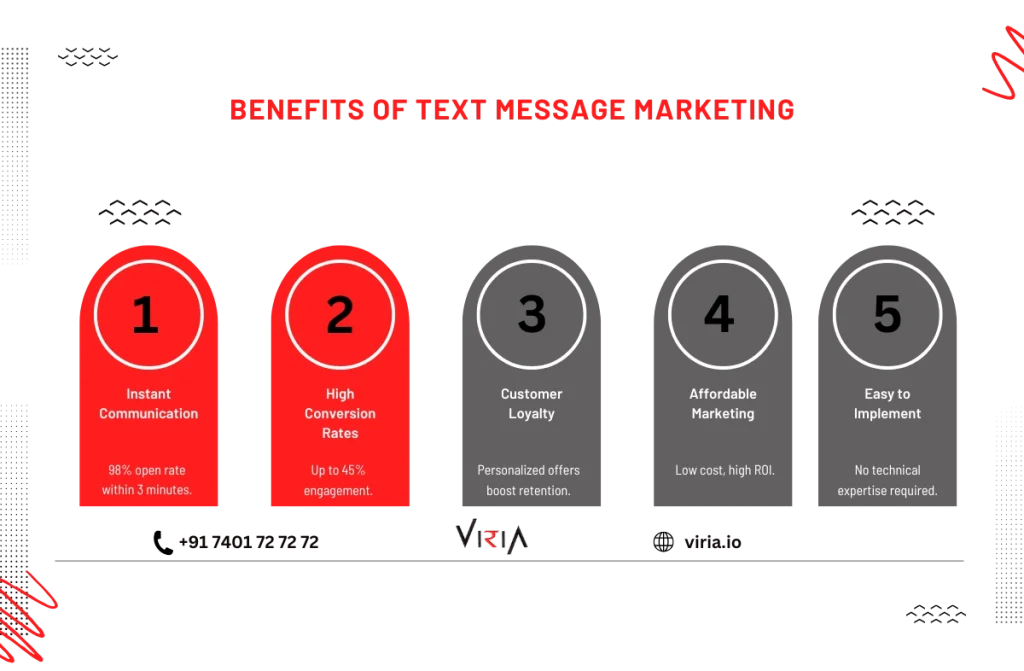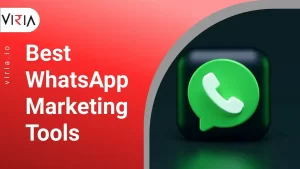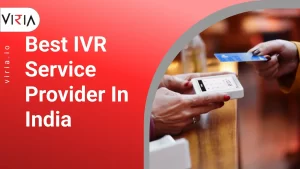In today’s fast-paced digital world, text message marketing for small business is an efficient and cost-effective tool that helps businesses directly reach their customers. With high open rates, this form of marketing has become essential for small businesses to foster relationships and boost sales. Whether you’re promoting a flash sale or sending reminders, text message marketing ensures your message reaches the right people instantly. In this blog, we’ll explore how small businesses can leverage text marketing to grow and thrive in a competitive market.

What is Text Message Marketing?
Text message marketing is a strategy where businesses send promotional messages, alerts, or notifications directly to their customers’ phones. This method offers an intimate and immediate way of reaching out to your audience. For small businesses, it provides an edge in connecting with customers on a more personal level, building strong relationships, and increasing customer loyalty.
Not only does text message marketing for small business provide higher open rates compared to emails, but it also ensures that your message is seen almost immediately.
How Can Text Message Marketing Help Your Small Business Grow?
Here are some tangible ways in which text marketing for small business can drive growth:
- Direct Communication: Text message marketing allows small businesses to communicate directly with customers, bypassing social media algorithms and email filters. It ensures your message gets seen.
- Real-Time Engagement: With texts being opened within minutes of delivery, you can send time-sensitive information like flash sales or last-minute offers, encouraging immediate action.
- Customer Loyalty Programs: Rewarding loyal customers with exclusive discounts or early access to sales can help you retain your most valuable clients.
- Cost-Effective Advertising: SMS marketing requires minimal investment compared to other marketing strategies, making it ideal for small businesses with limited budgets.
Additionally, businesses using sms marketing for small business chennai can target local audiences more effectively by sending geo-targeted offers, enhancing the relevance and impact of their campaigns.
Why Small Businesses Should Consider Exploring SMS Marketing
In today’s competitive business environment, small businesses need to embrace innovative strategies to stay ahead. One such powerful tool is text message marketing for small businesses. With the increasing reliance on mobile phones for communication, SMS marketing offers an opportunity for businesses to directly engage with their audience. It allows small businesses to reach their target customers more personally and timely, ensuring a stronger connection and boosting their sales. Below are the key reasons why small businesses should consider SMS marketing:
- Immediacy and High Open Rates: Text messages have an extremely high open rate, with many customers reading them within minutes of receiving them. This instant connection is invaluable for businesses looking to increase their customer engagement and response time.
- Cost-Effective Communication: SMS marketing is a budget-friendly option compared to traditional marketing methods. It allows businesses to send promotions, updates, and personalized offers without the high costs associated with print ads or television commercials.
- Direct and Personalized Engagement: With SMS marketing, businesses can send targeted, personalized messages to their customers. Whether it’s an exclusive offer, a reminder, or a special promotion, personalized messages can help improve customer loyalty and satisfaction.
- Stronger Customer Relationships: By staying in direct and frequent contact with customers, small businesses can build stronger, more lasting relationships. SMS marketing allows businesses to communicate quickly, addressing customer needs and concerns in real time.
By leveraging SMS marketing, small businesses can effectively cultivate better customer relationships and drive sales in a manner that is both personal and timely.
How Should a Small Business Use Text Message Marketing?
To maximize the effectiveness of sms marketing for small business, it’s essential to follow best practices:
- Build Your Subscriber List: Ensure that your customers opt-in to receive text messages. This will not only comply with regulations but also ensure that your messages are welcomed.
- Keep Your Messages Short and Clear: Customers appreciate brevity, so your text should deliver value in as few words as possible.
- Timing Matters: Send your messages during appropriate hours when customers are more likely to engage, such as mid-morning or late afternoon.
- Incorporate a Clear Call-to-Action (CTA): Whether it’s “Click here for 10% off” or “Reply YES to book now,” ensure that your message has a clear action for the customer to take.
Remember, the key to successful text message marketing for small business lies in offering value. Don’t just promote products; send personalized messages that resonate with your audience.
What to Expect When You Start Text Marketing
Starting text marketing for small business can feel overwhelming, but the results are often immediate and rewarding. Here’s what you can expect:
- Quick Customer Responses: Since text messages are opened quickly, you’ll often see immediate responses from your customers.
- Higher Conversion Rates: Text marketing typically has higher engagement rates compared to email and social media marketing, driving more conversions.
- Increased Brand Awareness: Regular updates via SMS help to keep your brand at the forefront of your customers’ minds.
For businesses using sms marketing for small business chennai, starting local campaigns can result in rapid customer acquisition as more people become aware of your offerings.
What Makes a Great SMS App for Small Businesses?
Selecting the right SMS platform is critical to the success of your campaign. Here are key features to look for in a good SMS app:
- User-Friendly Interface: Choose an app that is easy to navigate, allowing you to set up campaigns, send messages, and track performance with ease.
- Automation: The app should allow you to schedule messages, so you can send timely promotions without having to manage every campaign manually.
- Audience Segmentation: Look for an app that allows you to categorize your audience based on demographics or behavior for more targeted messaging.
- Regulatory Compliance: Ensure that the app complies with all relevant SMS marketing laws, such as the Telephone Consumer Protection Act (TCPA).
Platforms like SimpleTexting and Constant Contact offer powerful SMS features tailored specifically for small businesses, making sms marketing for small business both efficient and effective.
How to Use SMS Marketing Effectively
To harness the power of sms marketing for small business, follow these steps:
- Opt-In and Opt-Out Options: Ensure your customers can easily sign up for and opt out of receiving messages.
- Keep It Personal: Address customers by their name or send customized offers based on their previous purchases.
- Incorporate Time-Sensitive Offers: Promote flash sales or limited-time discounts to create a sense of urgency.
- Track Performance: Use built-in analytics to monitor open rates, clicks, and conversions to refine your campaigns.
Small businesses in Chennai using sms marketing for small business chennai can attract local customers by offering exclusive city-specific deals, giving them an edge over competitors.
5 Industry-Specific SMS Marketing Examples
Here are five examples of how different industries can use SMS marketing:
- Retail: Promote flash sales and send discount codes to your VIP customers.
- Health and Wellness: Remind clients of appointments or send tips on staying healthy.
- Real Estate: Notify clients about new property listings or upcoming open houses.
- Hospitality: Send guests special offers or reminders about their reservations.
- Education and Student Engagement: Remind students about upcoming classes or exams.
Each of these industries can use SMS marketing to foster stronger customer relationships and drive more engagement.
Benefits of Text Message Marketing for Small Business
- High Engagement Rates: SMS messages have an incredibly high open rate, with over 90% of text messages being opened within minutes of receipt. This is a far higher rate compared to emails, making text message marketing for small business a reliable method to capture customer attention.
- Cost-Effective: Compared to traditional advertising methods, SMS marketing is affordable, making it ideal for small businesses with limited marketing budgets. The cost of sending bulk SMS messages is relatively low, allowing businesses to reach a larger audience without breaking the bank.
- Direct Communication: SMS marketing provides a direct line to your customers’ phones, ensuring that your message reaches them. This immediacy is perfect for promotions, reminders, or alerts, enhancing customer retention and satisfaction.
- Personalized Messaging: Through SMS marketing, small businesses can tailor messages to specific customer groups based on their interests, behaviors, or demographics. This personalized approach increases the chances of conversion, as customers are more likely to engage with relevant offers.
Conclusion
In conclusion, text message marketing for small business is a powerful tool that allows businesses to reach their customers directly and effectively. Whether you’re using sms marketing for small business chennai or anywhere else, it’s time to integrate this strategy into your marketing efforts. From promotional offers to customer feedback, text message marketing can help your business grow, retain customers, and stand out in a competitive market.
Read also SMS Marketing Strategy




